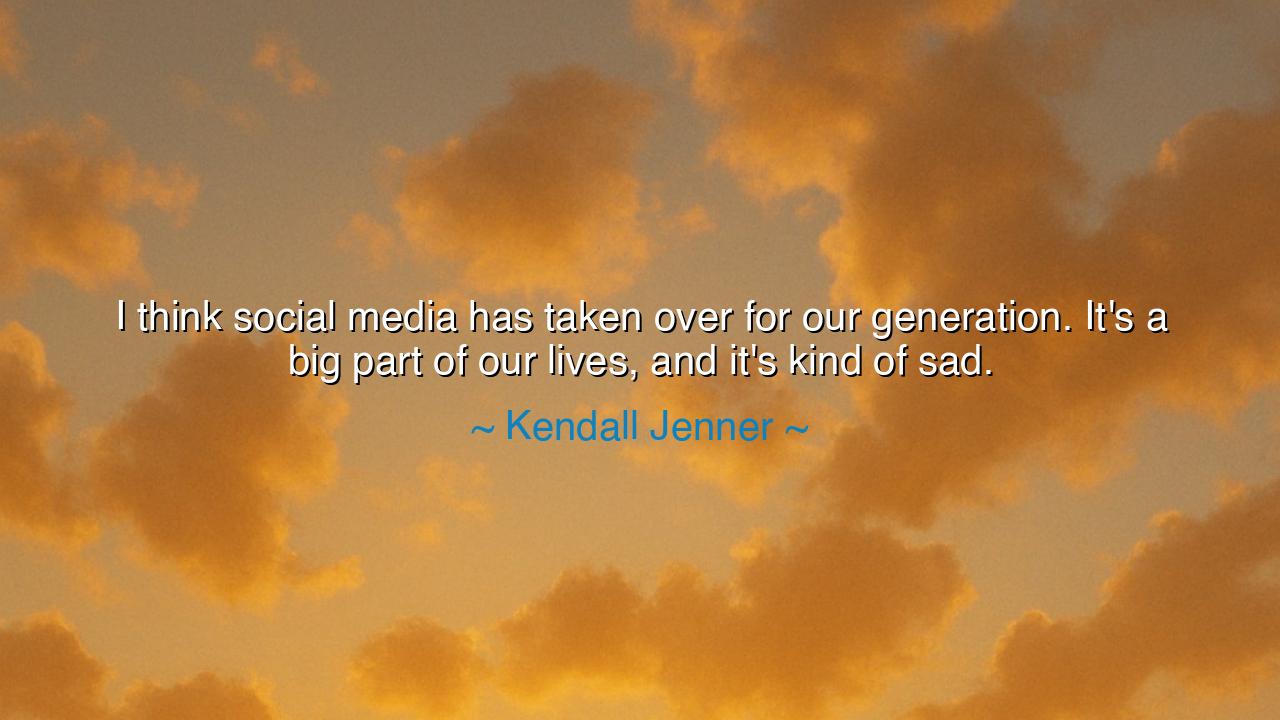
I think social media has taken over for our generation. It's a
I think social media has taken over for our generation. It's a big part of our lives, and it's kind of sad.






The words of Kendall Jenner, “I think social media has taken over for our generation. It's a big part of our lives, and it's kind of sad,” may seem simple, yet they hold a quiet depth — a lament for an age enthralled by its own reflection. Beneath the surface of this statement lies the echo of a timeless truth: that when tools meant to connect the human spirit begin to consume it, joy becomes hollow and connection turns to illusion. Her tone is not one of condemnation, but of sorrow — the sorrow of witnessing her generation, the youth of her time, lose part of their authentic humanity to a glowing screen.
In ancient times, philosophers warned of similar dangers, though their words were spoken long before the age of the internet. Socrates, in the dialogues of Plato, cautioned that the written word itself might weaken memory and understanding — that people would mistake the appearance of knowledge for true wisdom. So too does Kendall’s reflection mirror that fear, but on a grander scale. For in our era, social media has not only changed how we remember, but how we feel, how we define ourselves, and how we measure worth. The mirror of the soul has been replaced by the mirror of the feed, and in this reflection, many lose the quiet stillness that once allowed self-knowledge to grow.
What Kendall calls “sad” is not merely the dominance of technology — it is the fading of genuine presence. Once, people gathered to share stories face to face, to look into each other’s eyes, to listen. Now, conversation is fragmented into images and fragments of text, sincerity traded for performance. The laughter of the heart is replaced by the applause of strangers. And so, a generation that is more connected than any before it often feels more lonely than those who lived without electricity, without telephones, without anything but one another. The sadness she names is the quiet ache of souls that have forgotten the simple peace of being unseen.
Consider, for example, the story of Narcissus, from the myths of ancient Greece. He was a youth of striking beauty who, upon seeing his reflection in a still pool of water, fell in love with his own image and could not look away. Day after day, he stared, captivated, until he withered and died, leaving only the echo of his name. The ancients told this story not merely as a fable about vanity, but as a warning about the enslavement of the self to illusion. Social media, in its modern form, is the mirror of Narcissus made infinite — a pool that never dries, where every soul may gaze upon its reflection endlessly. And as Kendall observes, many have become trapped in its shimmering surface, mistaking digital admiration for love, attention for purpose, and validation for peace.
Yet her reflection also carries a seed of hope, for to see the sadness is to begin to awaken from it. Awareness is the first act of liberation. When Kendall says “it’s kind of sad,” she invites her generation to look inward — to ask whether the constant need to be seen has stolen the beauty of simply being. The ancients would have called this question philosophia, the love of wisdom, for it demands courage to confront the truth of one’s own dependence. To live wisely in the modern world is not to reject technology, but to rule it rather than be ruled by it. To use the tool without becoming its servant.
We might look also to Henry David Thoreau, who withdrew from society in the 19th century to live simply by Walden Pond. He wrote, “Men have become the tools of their tools.” Though his world knew no smartphones, his insight speaks precisely to Kendall’s concern. The more we seek meaning in devices, the more we lose the sacred art of solitude, reflection, and real communion. Thoreau urged man to return to nature, to silence, to thought. Likewise, Kendall’s lament calls her generation — not to abandonment of the digital, but to remembrance of the real: the sound of laughter not recorded, the beauty of a moment not shared, the calm of a mind not scrolling.
The lesson is both simple and profound: reclaim your attention. For attention is the truest form of love. Direct it toward what nourishes, not what drains. Speak with those near you; walk beneath the sky; touch the world with your hands, not merely with your thumbs. Use social media as a tool for creation, not comparison. And remember — you are not your image; you are your essence. The ancients would say that a life filled with constant noise cannot hear the whisper of truth.
So let these words endure as a reminder for generations to come: technology should serve the heart, not replace it. There is no shame in being born into a world of glowing screens, but there is tragedy in forgetting the warmth of human light. Kendall Jenner’s reflection, humble and melancholy, is the call of a young soul awakening in a digital age — a voice reminding her peers that the truest connection is not found in likes or followers, but in the timeless grace of being fully alive, fully present, and deeply human.






AAdministratorAdministrator
Welcome, honored guests. Please leave a comment, we will respond soon